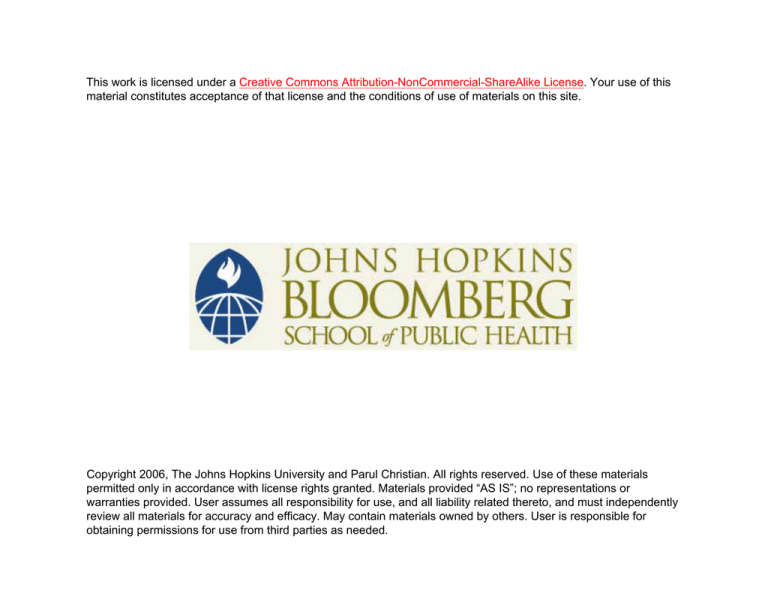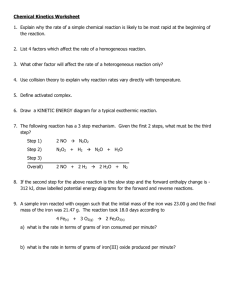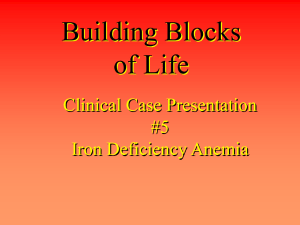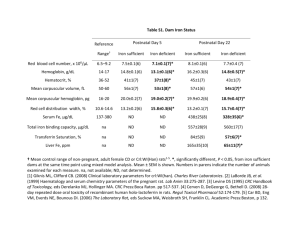
This work is licensed under a Creative Commons Attribution-NonCommercial-ShareAlike License. Your use of this
material constitutes acceptance of that license and the conditions of use of materials on this site.
Copyright 2006, The Johns Hopkins University and Parul Christian. All rights reserved. Use of these materials
permitted only in accordance with license rights granted. Materials provided “AS IS”; no representations or
warranties provided. User assumes all responsibility for use, and all liability related thereto, and must independently
review all materials for accuracy and efficacy. May contain materials owned by others. User is responsible for
obtaining permissions for use from third parties as needed.
Iron Deficiency and Anemia
Causes, Consequences, and
Solutions
Parul Christian
International Nutrition
2005
Outline
•
•
•
•
Anemia, ID, IDA – Global burden
Iron requirements
Etiology of IDA
Functional and health consequences of
ID and anemia
• Iron-infection interaction
• Strategies for combating iron deficiency
and anemia
Biologic Importance of Iron
• Iron is essential for almost all living
organisms
– Participates in oxidative and reductive
processes as part of redox enzymes and
thus plays an essential role in oxidative
energy production
– Involved in oxygen transport as part of the
heme molecule
Iron deficiency
• Importance
Iron deficiency is the most prevalent
nutritional deficiency in the world, and
probably the most important
micronutrient deficiency in the US.
Globally, it is estimated to affect 1.25
billion people
IDA
Iron
deficiency
Anemia
Iron deficiency vs. anemia
ACC/SCN 4th Report on World Nutrition Situation, Jan 2000
ACC/SCN 4th Report on World Nutrition Situation, Jan 2000
Iron compounds
(approx. values for a 55 kg woman)
Functional Compounds Hemoglobin
Myoglobin
Storage Complexes
222 mg
Heme enzymes
50 mg
Non-heme
enzymes
Transferrin
55 mg
Ferritin
Hemosiderin
Total
1700 mg
3 mg
200 mg
70 mg
2300 mg
Comparison of screening and definitive
measurements of iron status
Screening
Advantages
Limitations
1. Hemoglobin
Inexpensive, Universally
available
Low sensitivity, Low specificity
2. Transferrin saturation
Inexpensive, Well
established
Wide diurnal variation, Low
specificity
3. Mean corpuscular Hb
Well available, established
Late indicator, low specificity
4. Zinc protoporphyrin
Portable assay, Inexpensive
Automation difficult, Affected by
lead exposure
1. Serum ferritin
Quantitative (stores), well
standardized
Affected by inflammation, liver
disease
2. STfr
Quantitative (tissue
deficiency) unaffected by
inflammation
Affected by recombinant human
erythropoietin
3. Bone-marrow iron
Well established, high
specificity
Affected by EPO treatment,
invasive, expensive, error-prone
Definitive
Cook JD; Best Pract Res Clin Haematol 2005
Quantitative assessment of body iron
Body iron (mg/kg) =
-[log (R/F ratio) – 2.8229]/0.1207
R = transferrin receptor
F = ferritin
Cook JD; Blood 2003
Defining anemia at sea level
Age or Sex group
Hb below
g/dL
11.0
Hematocrit
below %
33
Children 5-11 y
11.5
34
Children 12-13 y
12.0
36
Non-pregnant women
12.0
36
Pregnant women
11.0
33
Men
13.0
39
Children 6mo-5 y
Stoltzfus & Dreyfuss; INACG/UNICEF/WHO 1998
Dietary Iron
• Two types of iron
– Heme iron (animal sources)
– Non-heme iron (plant sources)
• Absorption of heme iron is 20-30%
• Absorption of non-heme iron varies
between 1-10% and is much more
affected by iron status and intraluminal
factors
Non-heme Iron Absorption
• Enhancers : ascorbic acid, meat
• Inhibitors : phytates, phosphates,
tanins, oxalates, soy protein
• Other nutrients: zinc, calcium
Iron requirements for growth
Group
Age (y) Wt gain Mg iron/kg Mean iron for
(kg)
body wt
growth (mg/d)
Children 0.25-1 4.2
37
0.65
1-2
2.4
37
0.24
2-6
7.9
40
0.22
6-12
20.2
41
0.38
Boys
12-16 26.2
46
0.66
Girls
12-16 15.2
43
0.36
Iron Losses
Men and Post-menopausal Women
Area of loss
Amount (mg/d)
Feces
0.2-0.5
Urine
0.2-0.3
Sweat, hair, nails
0.2-0.5
Total
0.8-1.0
Iron Losses
(Menstruating women - 55 kg)
•Additional loss of 0.5 mg/d of Fe occurs
due to menstruation; range is high
Basal Fe
loss
Menstrual
Fe loss
Total Fe
loss
µg/kg/d
No
contraceptive
Oral
contraceptive
IUD
14
8
22
14
4
18
14
16
30
Causes of anemia
• Major causes
– Iron deficiency (1300-2200 m)
– Hookworm (876 m)
– Vitamin A deficiency (300 m)
– Malaria infection (300 m)
• Other Important causes
– Chronic infections: TB, HIV
– Other vitamins
– Genetic defects
Hookworm and Malaria in the Etiology of
Iron Deficiency and Anemia
% severe anemia (Hb <80 g/L)
80
70
60
50
40
30
20
10
0
0
1-
1000-
5000+
0
1-
1000-
5000+
Hookworm eggs, n/g feces
Age < 30 months
Proportion of Zanzibari
children with severe
anemia (hemoglobin <80
g/L) by malaria parasite
density or hookworm fecal
egg counts and age
group. Chi-square tests
for trends of association:
malaria parasite density in
age <30 months,
P<0.00001, age ≥ 30
months, P>0.20.
Hookworm fecal egg
counts in age <30 months,
P = 0.002, age ≥30, P =
0.005.
Age ≥ 30 months
Adapted from: Stoltzfus et al, J Nutr 2000
Hookworm and Malaria in the Etiology of Iron
Deficiency and Anemia
% severe anemia (Hb <80 g/L)
70
60
50
40
30
20
10
0
0
1-
0
1-
2000-
4000+
Malaria parasites, n/uL blood
Age < 30 months
Age ≥ 30 months
Proportion of Zanzibari children with severe anemia (hemoglobin <80 g/L) by malaria parasite density or
hookworm fecal egg counts and age group. Chi-square tests for trends of association: malaria parasite
density in age <30 months, P<0.00001, age ≥ 30 months, P>0.20. Hookworm fecal egg counts in age <30
months, P = 0.002, age ≥30, P = 0.005.
Adapted from: Stoltzfus et al, J Nutr 2000
Etiologies of anemia in
pregnant rural Nepali women
% Anemic (Hb<90g/L)
35
>2000
+ve
30
25
20
15
10
Low
1000-1999
-ve
1-999
Adequate
0
5
0
Hookworm
Malaria
Serum retinol
Dreyfuss et al, J Nutr 2000
Deficiency of vitamins may cause anemia
• RBC production
(erythropoeisis)
• Protect mature RBC
free radical oxidation
• Fe mobilization
• Fe absorption
– VA, FA, B12, B6,
riboflavin
– VC, VE
– VA, VC, riboflavin
Fishman, Christian and West et al, PHN 2000
Vitamin A and iron interaction in
Indonesian pregnant women
100
% non anemic
80
60
40
20
0
Placebo
VA
Fe
VA+Fe
Suharno et al, AJCN 1993
Iron and micronutrients supplementation in
anemic Mexican children - RCT
Change in Hb (g/L)
(Lopez et al, J Nutr 2001)
1.6
1.4
1.2
1
0.8
0.6
0.4
0.2
0
*
Placebo
Fe
Fe+B12
Fe+MN
B2, B12, A, B6, E, folic acid, zinc, copper
Impact of antenatal multiple
micronutrient supplementation on
anemia in the third trimester
% Hb < 110g/L
FAFe
MM
40
35
30
25
20
15
10
5
0
Nepal
Mexico
Christian et al, J Nutr 2003; Ramakrishnan et al, J Nutr 2004
Consequences of Iron
Deficiency and Anemia
•
•
•
•
•
•
Decreased work capacity
Prematurity and LBW
Perinatal mortality
Maternal mortality
Child mortality
Impaired neurocognitive function in
children
Iron and work capacity
Iron deficiency
Tissue Oxidative Capacity
Work capacity
Oxygen Carrying Capacity
Energetic efficiency
Endurance
VO2max
IDA
Anemia
Iron deficiency and anemia and
work capacity
• Laboratory studies
• IDA causally associated
with 10-50% reduction
in VO2 max
• No clear association
between IDA and
endurance capacity
• ID may impair energetic
efficiency
• Field studies
• Provide further causal
evidence
• ID and IDA may affect
productivity
• Institutional and
technological factors
may constrain ability or
motivation of subjects
What does this mean?
• Productivity losses due to iron
deficiency
• Losses to GNP estimated from 6
countries range from 0.85% to 1.27%
• South Asia, where ID is high, loses $ 5
billion annually
Consequences of Pregnancy Anemia
Low birthweight
Maternal anemia
(any cause) during
pregnancy
Preterm
FGR
Perinatal
death
Preterm and
FGR
Adapted from Rasmussen, J Nutr 2001
Fetal/Placental development
• Maternal hematocrit determines O2
tension in amniotic fluid (Nigeria)
• Maternal anemia/iron status influences
placental size, morphology
• ID may be associated with increases in
maternal ACTH and cortisol
Proportion (%) with birthweight
<2500g
Child Development
30
25
20
15
10
5
0
85 or 86-95
less
96105
106115
116125
126135
136145
Over
145
Haemoglobin Concentration (g/L)
Incidence of low birth weight (<2500 g) by haemoglobin concentration (g/L).
*Data for white women only.*
Adapted from: Steer et al; BMJ 1995
Child Development
Incidence of preterm labor (<37 full wekks) by
haemoglobin concentration (g/L) *Data for white
women only.*
Proportion (%) of
preterm births
(<37 weeks)
30
25
20
15
10
5
0
85 or 86-95
less
96105
106115
116125
126135
136- Over
145 145
Haemoglobin Concentration (g/L)
Adapted from: Steer et al; BMJ 1995
Antenatal iron and low birth weight
• All systematic reviews of RCTs have
found evidence to be inconclusive
(Rasmussen 2000)
– Mainly because of poorly conducted
studies, inadequate design, low sample
size, biases
• Recent trials in Nepal and the US found
that antenatal iron supplementation
increased birth weight
Effect of antenatal iron supplementation
on birth weight in rural Nepal
•Iron
folate improved birth weight by about 80g for weights below 2800 g
Christian et al; unpublished
Anemia and maternal mortality
• No clinical trials, but strong clinical impression
• “At 6.0g/dL evidence of circulatory
decompensation becomes apparent. Women
experience breathlessness and increased
cardiac output at rest. At this stage, added
stress of labor can result in maternal death.
Without effective treatment, maternal death
from anemic heart failure is likely with Hb
concentration of 4.0g/dL. Even a blood loss of
100 ml can cause circulatory shock and
death.” (INACG Statement)
Child Mortality
• Relationship through infectious disease
incidence is unlikely
• Relationship through anemia is
possible, and probably severe anemia
of any cause
Nepal Trial
•
•
•
•
•
RCT, 2x2 factorial design
Placebo, Fe+FA, Zn, Fe+FA+Zn
Children ages 2-35 mo
Outcome: Infant/Child survival
Iron arms of the trial stopped because
of a lack of any impact on infant/child
survival
Tielsch et al; unpublished
Child Development
• Iron may affect brain development through decreased
brain iron which affects
– Myelination
– Neural transmission systems (both neuronal metabolism and
dopaminergic functioning)
• Functions affected
– Delays in maturation of visual, auditory, motor functions and
other aspects of neurofunctional development (e.g.
recognition memory)
– Child-caregiver interaction
– Child “functional isolation” through lack of exploratory
movement
Iron status and neurocognitive
development
Nutritional Status
in Early Childhood
Iron
Status
Birthweight
Brain and
Neural
Function and
Development
Cognitive
Outcomes
Physical Growth
Nutritional Status
during Pregnancy
Motor
Development
Exploration
Motor Activity
Emotional
Regulation
Causal link
Caregiver
Behavior
Bi-directional
link
Effect
modification
BIRTH
EARLY
CHILDHOOD
EARLY
SCHOOLAGE
Modified from Pollit E; EJCN 2000
Child Development
Long-term Outcome of Infants with Iron Deficiency
Deviation from Comparison Group (SD units)
0.2
0.1
0
-0.1
-0.2
-0.3
-0.4
-0.5
-0.6
-0.7
-0.8
Picture
Spatial
Visual- Quantitative Visual
Vocabulary Relations auditory Concepts
Matching
Drawa-man
VMI
Woodstock-Johnson
Gross
Motor
Fine
Motor
BruininksOseretsky
Verbal
IQ
Performance IQ
WPPSI
Adapted from Lozoff et al; NEJM 1991
Language scores in four treatment groups with
differences in scores showing effects of treatment
Treatment
Final language
score*
Placebo (n=85)
13.1 (12.7 to 13.9)
Mebendazole (n=85)
13.5 (12.6 to 14.4)
Iron (n=94)
14.0 (13.2 to 14.8)
Mb + iron (n=85)
14.2 (13.4 to 15.0)
Difference in
score†
Effect of iron v no iron
0.8 (0.2 to 1.4)
Effect of Mb vs no Mb
0.3 (−0.3 to 0.9)
Stoltzfus et al; BMJ 2001
Child Development - Summary
• Evidence favors a true relationship, but
not conclusive; data from RCTs are not
consistent
• Issues of timing, reversibility and
optimal intervention remain unresolved
• Predictive and construct validity of
Bayley’s scales is questionable
Tissue Iron
Deficiency
Severe
Anemia
Work performance
Work performance
Child mortality
Maternal mortality
Perinatal mortality
Other Factors
Adapted from: Stoltzfus RJ; J Nutr 2001
Iron Supplementation and Infectious
Disease
• 3 Systematic reviews:
– Shankar et al (iron supplementation and
malaria)
– Oppenheimer (all interventions, all ages, all
outcomes)
– Gera and Sachdev (iron supplementation
and incidence of infections in children)
INACG Consensus Statement-1999
(based on Shankar et al.)
• “Known benefits of iron supplementation
are likely to outweigh the risk of adverse
effects caused by malaria…Oral iron
supplementation should continue to be
recommended in malarious areas where
IDA is prevalent”.
Belmont meeting* conclusion
(based on Oppenheimer)
• Evidence not convincing for or
against a relationship of public
health significance
* WHO/INACG convened meeting
Oppenheimer SJ; J Nutr 2001
Iron supplementation in young
children in Pemba, Zanzibar
• 2x2 factorial study of iron-folic acid and zinc
in malaria endemic Pemba island
• The iron arms of the trial were discontinued
due to evidence of increased hospitalization
and mortality
• In a subsample, where children received
treatment for malaria and other infections,
iron reduced mortality in iron deficient
children
Sazawal, Black, Unpublished
Infectious disease and iron
supplementation - summary
• IF an adverse relationship exists, it probably
derives from risks of iron intervention, not
protective effect of iron
• THUS, question is NOT : Is it better for
children to be iron deficient
• BUT RATHER: How can we safely correct
iron deficiency?
• Pemba study suggests screening and
treatment of malaria and other infections may
be required
Prevention and treatment guidelines for iron
supplementation (WHO/UNICEF/INACG)
• Pregnant women:
– Prevention: 60 mg iron + 400 µg folic acid daily for
6 mo in pregnancy
– Treatment of severe anemia: 120 mg iron + 400
µg folic acid daily for 3 mo
• Children 6-24 mo:
– Prevention: 12.5 mg iron + 50 µg folic acid daily
from 6-12 mo of age or from 2-24 mo of age if lbw
– Treatment of severe anemia: 25 mg iron + 100400 µg of folic acid daily for 3 mo
• Children 2-5 yr : 20-30 mg iron
• Where hookworm is endemic, give anthelminthics
Prevention Strategies
• Supplementation of target populations – little
success in pregnancy
• Dietary diversification/modification – can it
work?
• Fortification –Potential vehicles: cereals, flour,
condiments, infant formula. Issues regarding
the appropriate vehicle, type of fortificant,
organoleptic properties, bioavailability,
efficacy and effectiveness
Table 8.1 Different Options for Aims of Iron Supplementation
Activities in Terms of Hemoglobin Concentration (Hb)
Aim
Whom to
Supplement
Programmatic
Implications
Reach
full Hb
potential
(prevent
and
treat)
All
Routine
supplementation
of all women
Prevent
low Hb
level
Those at risk
for low Hb
level
Routine or
screening
Treat low
Hb level
Those below
low Hb level
Screening low
level
How to
Evaluate
Aim
Advantages
Disadvantages
All who may
benefit receive
supplement
Low
effectiveness
% above
low Hb
level
Moderate
effectiveness
Uncertainty of
cut-off levels,
difficulties in
screening?
% above
low Hb
level
High
effectiveness
Uncertainty of
cut-off levels,
difficulties in
screening?
Adapted from: Ekstrom EC; In: Nutritional anemias (ed Ramakrishnan U). CRC Press 2001
Difficulties in Iron Supplementation
Thailand India
Indonesia Myanmar Caribbean
Service
Utilization
***
****
**
***
*
Tablet
supply
***
***
**
**
**
**
*
*
*
*
*
*
*
Within**
facility
factors
Individual *
compliance
**** major constraint
* minor constraint
Effectiveness of iron-fortification
Iron coated-rice among Philippino children
Hb (g/dl)
Ferritin (mg/L)
25
20
15
10
5
0
Baseline
After 6 mo
Mannar & Gallego, J Nutr 2002
Effectiveness of iron-fortification
Iron-fortified fish sauce in Vietnam
Hb (g/dl)
Iron fish sauce
Control
118
116
114
112
110
108
106
104
102
100
T0
T3
T6
Mannar & Gallego, J Nutr 2002
Special case - Infants
• Infants are born with high iron stores
• Human milk has low iron content but
bioavailability is high
• First 2-3 mo of life: exclusively BF infant is in
positive iron balance
• During 3-6 mo of life infants are in negative
balance
• Foods with bioavailable iron, fortified foods or
a low-dose iron supplement should be
provided at 6 mo (IOM recommendation)
IDA (%)
Prevalence of IDA among
8-mo old infants
18
16
14
12
10
8
6
4
2
0
Fortified
Cereal
Unfortified
Cereal
Fortified
Formula
BF
fortified
cereal
BF
unfortified
cereal
Walter et al, Pediatrics 1993
Home-fortification or Sprinkles
• “Sprinkles” are single-dose sachets
containing micronutrients in a powdered form,
which are easily sprinkled onto any foods
prepared in the household
• Great for adding to complementary foods for
young children
• Any homemade food can be fortified with the
single-dose sachets, hence the term “home
fortification”.
• Sprinkles Nutritional Anemia Formulation has
been tested in infants
Effective control of anemia
through combination of strategies
• Increased iron intake
– Iron supplementation
– Fortification of foods with iron (especially weaning
foods)
• Control of parasitic infections (diagnosis and
treatment, chemoprophylaxis, preventing
transmission)
• Increased intake of other vitamins such as
vitamin A, folic acid through
– Supplementation, Fortification, Nutrition Education
Summary
• Causes of iron deficiency and anemia
are multifactorial
• The strength of causal evidence that ID
or anemia affects functional outcomes is
variable
• Control of iron deficiency and anemia
may require multiple strategies and is
context specific
Copyright 2005, Parul Christian and The Johns Hopkins University. All rights reserved. Use of these materials permitted only in
accordance with license rights granted. Materials provided “AS IS”; no representations or warranties provided. User assumes all
responsibility for use, and all liability related thereto, and must independently review all materials for accuracy and efficacy. May
contain materials owned by others. User is responsible for obtaining permissions for use from third parties as needed.





